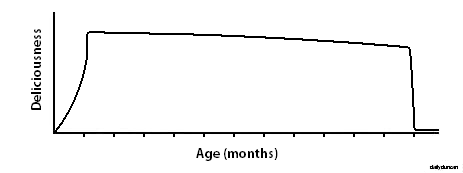Olfaction is the means by which vertebrates sense whether or not something is delicious. Before we eat any mysterious food, we usually smell it to make sure that it’s not something we won’t enjoy. Some things have an appealing smell, like flowers, but their aroma doesn’t make us want to eat them. This is an obvious trick that nature uses to get us to eat inedible things. Mastering the ability to discern which smells indicate edibility is a lifelong process of trial and error.
There are also undesirable smells, like that of decaying flesh, which discourage us from ingesting their sources. What’s interesting about smelling is that it doesn’t actually prevent disgusting things from entering our body. Think about it, how could we detect the scent of rotten meat if no part of it was in contact with us?
Some have proposed that the particles which we detect with our noses are somehow different from the ones that actually comprise the source. These imaginary devices are called smell particles, and their invention is solely meant to conceal the fact that when we smell something, tiny pieces of that thing are entering our body. To more accurately understand olfactory mechanics, think of smelling as merely tasting from a distance. This might not seem like an important revelation, but the consequences can be alarming.
The thought of flower particles wafting into our nostrils likely won’t upset anyone, but when we imagine less pleasant fragrances, like those found in outhouses or garbage dumps, the gravity of the situation takes hold. Whenever we smell a dump, whatever kind of dump, particles of excrement and refuse are going inside of us. There is no enchanted smell particle that protects us from nasally ingesting these awful things, a fact proven by the damage caused by sniffing toxic chemicals. Thankfully, many of these potentially harmful particles are caught in our nasal passages before reaching vital areas. This realization, combined with cultural condemnation, should ensure that booger-eating is eradicated.
The use of air fresheners is a popular solution to stinky situations, but while they claim to neutralize odors, they only ensure that we are inhaling the undesirable particles as well as a concoction of unnatural chemicals. One popular brand contends that its product actually eliminates odors rather than covering them up. The company recently released a line of products that are completely odorless, which they see as proof of their product’s neutralizing powers. As the commercials illustrate, these products are able to make even the most filthy, unsanitary space smell fresh and clean. But even if an air freshener could completely remove all odors from the air, it doesn’t address the cause of such smells.
Things stink because they’re dirty, and dirty things need to be cleaned. When the garbage can stinks, it’s time to empty it; when the cat litter is foul, it’s time to change it, and when our body reeks of sweat, it’s time to bathe. The problem with a rotten smell is not our ability to detect it, but that something is rotten.
The reason people don’t live in filth is not because of the smell; it’s because humans have a disdain for unclean things. Although our ideas of cleanliness may differ, most would agree that it is not good to let things rot or decay. Our sense of smell is a tool that we use to determine whether or not something is clean, which also helps to determine edibility. By using air fresheners to mask or eliminate odors, we are effectively removing our capacity to detect uncleanliness through olfaction – as much a solution as plugging our nose.
But unlike plugging our nose, air fresheners don’t prevent us from taking particles of toxic or filthy things into our bodies. Even the air fresheners that claim to eliminate odor don’t actually destroy these buoyant fragments of filth, but merely inhibit our ability to sense them. Also, aside from distorting our understanding of cleanliness, these products discourage us from obeying one of the most fundamental childhood lessons: cleaning up after ourselves.
Of course, most of us still recognize when something is dirty, for we can usually see the evidence. But perhaps one day air freshener companies will release a set of goggles that make dirt and messes invisible, thus altering our reality to a more pleasant state. After all, it seems as though we are as much concerned with the perception of cleanliness as cleanliness itself. Or, if we can’t wait for such technology, we could merely make do with something more primitive:

Be careful, little nose, what you smell.

